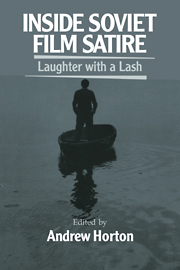Book contents
- Frontmatter
- Contents
- Foreword: If life itself is a satire …
- Acknowledgments
- Editor's note
- Introduction: Carnival versus lashing laughter in Soviet cinema
- Part One The long view: Soviet satire in context
- Part Two Middle-distance shots: The individual satire considered
- Part Three Close-ups: Glasnost and Soviet satire
- XII A forgotten flute and remembered popular tradition
- XIII Perestroika of kitsch: Sergei Soloviev's Black Rose, Red Rose
- XIV Carnivals bright, dark, and grotesque in the glasnost satires of Mamin, Mustafayev, and Shakhnazarov
- XV Quick takes on Yuri Mamin's Fountain from the perspective of a Romanian
- XVI “One should begin with zero”: A discussion with satiric filmmaker Yuri Mamin
- Filmography
- Contributors
- Index
XII - A forgotten flute and remembered popular tradition
Published online by Cambridge University Press: 07 October 2009
- Frontmatter
- Contents
- Foreword: If life itself is a satire …
- Acknowledgments
- Editor's note
- Introduction: Carnival versus lashing laughter in Soviet cinema
- Part One The long view: Soviet satire in context
- Part Two Middle-distance shots: The individual satire considered
- Part Three Close-ups: Glasnost and Soviet satire
- XII A forgotten flute and remembered popular tradition
- XIII Perestroika of kitsch: Sergei Soloviev's Black Rose, Red Rose
- XIV Carnivals bright, dark, and grotesque in the glasnost satires of Mamin, Mustafayev, and Shakhnazarov
- XV Quick takes on Yuri Mamin's Fountain from the perspective of a Romanian
- XVI “One should begin with zero”: A discussion with satiric filmmaker Yuri Mamin
- Filmography
- Contributors
- Index
Summary
Everyone remembers the episode in Bulgakov's Master and Margarita when, in the bedeviled Variety Theater, the chorus cannot stop singing the patriotic “Lake Baikal.” The chorus, by then an established institution of official popular culture, represents the height of Stalinism with its heroic tunes and a powerful collective voice. Constantly transmitted over the radio through my childhood in the fifties, it gave me an allergy to choral sound for years to come. But the female choir featured in Eldar Ryazanov's 1987 film, Forgotten Melody for a Flute, definitely sings a different tune. How the choir's tune and the “forgotten melody” of the solo flute represent the changing times will be the focus of my analysis of the use of official and unofficial popular culture in this early film of perestroika.
As we can see from the title, memory is important in this film, where the transition from the old to the new is in its nascent stages, confusing for everyone. The recovery of historical and cultural memory became a central concern of literature and art in the early period of glasnost, when the long years of repression gave way to revelation. As the “forgotten melody” (nezabyvaemaia melodiia) for a flute is remembered in Ryazanov's comedy, what does it or can it tell? While the central story of the film is that of adultery and romance, the stock plot is a vehicle for pointing out the ills plaguing Soviet society — the play of power, problems of gender and class in a country supposedly free of both, and the depth of corruption in the sphere of cultural politics.
- Type
- Chapter
- Information
- Inside Soviet Film Satire , pp. 117 - 124Publisher: Cambridge University PressPrint publication year: 1993

